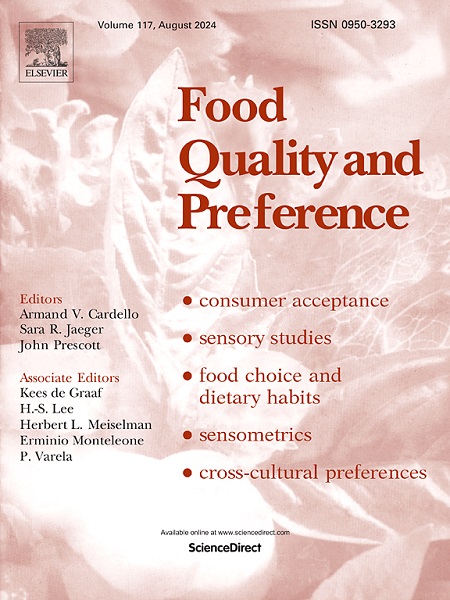Exploring energy drink consumption in emerging adulthood in Uruguay: A cross-sectional study
IF 4.9
1区 农林科学
Q1 FOOD SCIENCE & TECHNOLOGY
引用次数: 0
Abstract
The rising popularity of energy drinks among adolescents and young adults has raised concerns about their potential health and psychological effects. This study explored energy drink consumption among emerging adults in Uruguay, a high-income country in Latin America. A cross-sectional online survey was conducted with 321 participants recruited via social media. The questionnaire included closed, multiple-choice, and open-ended questions grouped into six sections: (i) self-reported consumption, (ii) intended effects, consumption occasions, and perceived negative effects, (iii) attitudes, (iv) strategies to discourage consumption, (v) psychological traits, and (vi) socio-demographic information. Results showed that 85.0 % of participants had consumed energy drinks at some point in their lives, 37.4 % in the past 30 days, and 17.4 % had mixed them with alcohol during that period. Logistic regression analyses revealed significant associations (p < 0.05) between consumption and gender, activity status, attitudes, and health/safety-related risk-taking tendency. Participants most frequently cited energy, wakefulness, and concentration as intended effects, often linked to demanding contexts such as studying late, working long hours, or going out at night, suggesting that energy drinks are commonly used as coping mechanisms. Participants suggested a range of strategies to reduce consumption, including educational campaigns, structural changes in academic and work environments, and regulatory measures. Overall, the findings underscore the importance of implementing multifaceted public health strategies that address both individual motivations and broader social and environmental influences on energy drink consumption.
探索能量饮料消费在乌拉圭新成年期:一项横断面研究
能量饮料在青少年和年轻人中越来越受欢迎,这引起了人们对其潜在健康和心理影响的担忧。这项研究探讨了拉丁美洲高收入国家乌拉圭新兴成年人的能量饮料消费。一项横断面在线调查通过社交媒体招募了321名参与者。问卷包括封闭式、多项选择和开放式问题,分为六个部分:(i)自我报告的消费,(ii)预期影响、消费场合和感知到的负面影响,(iii)态度,(iv)阻止消费的策略,(v)心理特征,(vi)社会人口信息。结果显示,85.0%的参与者在他们生命中的某个时刻喝过能量饮料,37.4%在过去30天内,17.4%在此期间将能量饮料与酒精混合。逻辑回归分析显示,消费与性别、活动状态、态度和健康/安全相关的冒险倾向之间存在显著关联(p < 0.05)。参与者最常提到能量、清醒和注意力集中是预期的效果,通常与要求很高的环境有关,比如学习到很晚、长时间工作或晚上外出,这表明能量饮料通常被用作应对机制。与会者建议了一系列减少消费的策略,包括教育运动、学术和工作环境的结构性改变,以及监管措施。总的来说,研究结果强调了实施多方面的公共卫生战略的重要性,这些战略既要解决个人动机,也要解决对能量饮料消费的更广泛的社会和环境影响。
本文章由计算机程序翻译,如有差异,请以英文原文为准。
求助全文
约1分钟内获得全文
求助全文
来源期刊

Food Quality and Preference
工程技术-食品科技
CiteScore
10.40
自引率
15.10%
发文量
263
审稿时长
38 days
期刊介绍:
Food Quality and Preference is a journal devoted to sensory, consumer and behavioural research in food and non-food products. It publishes original research, critical reviews, and short communications in sensory and consumer science, and sensometrics. In addition, the journal publishes special invited issues on important timely topics and from relevant conferences. These are aimed at bridging the gap between research and application, bringing together authors and readers in consumer and market research, sensory science, sensometrics and sensory evaluation, nutrition and food choice, as well as food research, product development and sensory quality assurance. Submissions to Food Quality and Preference are limited to papers that include some form of human measurement; papers that are limited to physical/chemical measures or the routine application of sensory, consumer or econometric analysis will not be considered unless they specifically make a novel scientific contribution in line with the journal''s coverage as outlined below.
 求助内容:
求助内容: 应助结果提醒方式:
应助结果提醒方式:


